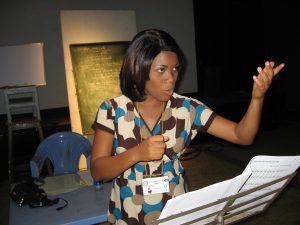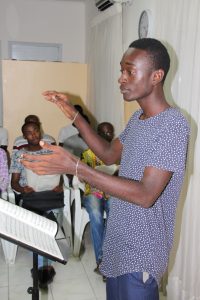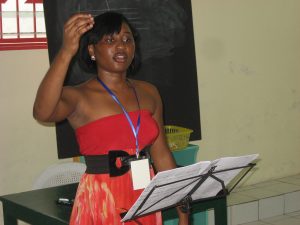Thierry Thiébaut, President ofÀ Cœur Joie International
The idea for the Conductors Without Borders (CWB) project came into being at the 2006 World Assembly of Choral Conductors Associations (WACCA), which was held in Buenos Aires and was organised by the ADICORA Federation.
Subsequent to the debates which unfolded there, it occurred to certain attending associations that, in many countries, choral singing lacks organisations that teach choir management. Such a call on behalf of conductors required a satisfactory response. The need to establish a network for these conductors was also made clear.
A planning committee dedicated to carrying out the project was set up and convened in Caracas in November 2007 upon Maria Guinand’s invitation. Alberto Grau, Daniel Garavano, Thomas Caplin, George Vance, André de Quadros and Thierry Thiébaut also attended the event. The objectives of the conference were laid out as follows: choral singing establishes the values of solidarity, respect, tolerance and communication amongst people. Choral singing, as a lingua franca, forms harmonious exchanges between individuals and unites them as members of a more efficient society. In such a manner, it contributes towards the establishment of peaceful relations.
Building on these observations, a general outline for the project’s operation has been decided. It is to be based upon the mutual gain received by the founders as much as by the target beneficiaries: sharing knowledge and expertise; training conductors with due consideration given to their local environment; preparation, should it be necessary, to become local instructors themselves; collaborations with teaching organisations in order to create community and cooperation between locals; establishment of ties and connections between countries with a view to overcoming potential socio-cultural, political and religious conflicts.

It goes without saying that taking the local context into account is vital. To assure this, the project must be sufficiently flexible and must remain very much open to change in accordance with the demands of future local developments. In terms of situational context, there is obviously a large degree of disparity from one country to the next, and from one continent to the next. Considering this, three key geographical areas have been highlighted for implementing the program: South and Central America, the Middle-East and South-East Asia, the African continent. Having spent time in Côte d’Ivoire, I’ve offered to assume responsibility for coordinating the program on the African continent. A Cœur Joie International comprises eight francophone federations there: Morocco, Senegal, Côte d’Ivoire, Togo, Benin, Cameroon, Gabon and the Democratic Republic of Congo.
The Conductors Without Borders project is not limited to French-speaking Africa. To date, contacts have been made and active steps taken in Ghana, Nigeria and Kenya. The population of Africa will double by 2050! Choral singing is widespread in the sub-Saharan part of the continent. Islam doesn’t practise polyphony. Its spirituality protects a musical expression faithful to tradition. Psalmody with respect to the Quran maintains a rich monody which has always also been a feature of secular music. With the exception of Morocco, Senegal and, to a lesser extent, Nigeria, in which the Muslim religion by far predominates, the other countries in which we have developed the program have an essentially Christian culture. There, polyphony has burgeoned naturally. For example, the capital of the Democratic Republic of Congo, Kinshasa, has around 12 million inhabitants and boasts around two thousand choirs. Sadly, music classes are distinctly absent and conductors are unable to take part in choir management training or access international repertoires.

The Conductors Without Borders project seemed a perfect fit for the purpose of providing training for choirmasters, an activity which is almost always organised in parishes, each being able to accommodate four to eight choirs. This, in turn, guarantees a plenitude of weekend services. Repertoires draw heavily from religious inspiration, whether they are indigenous compositions in a local dialect (there are almost five hundred in the Congo!), or inherited from classical repertoire or Western hymns. Bach and Handel jostle it out for the top spot and the “Hallelujah” chorus from Messiah frequently rounds off service performances. Only certain English-speaking countries on the continent have musical education centres in their universities (in Ghana and Kenya most particularly, of those countries in which we have an active presence). The quality of choirs typically suffers as a result of this shortage.
Since 2010, professional conductors from Europe and North America have generously offered to spend time helping with the development of the program started by the International Federation of Choral Music (IFCM). Following two cycles of three years in Kinshasa and Lubumbashi, the DRC now has five Congolese instructors who have been able to take the reins of training within the 2,345,000 km² country. Togo and Côte d’Ivoire, to a lesser degree, are beginning to train their own conductors, too. But singers also need to be taught to read music. The “sol-fa” technique introduced by missionaries presents a hurdle to regular solfège-style note-reading. Africans, through their culture, have a highly developed auditory memory but the notes on a score are not much help to them initially.
We regularly bring booklets on our missions to hand out to singers in a given choir for the purpose of training. Such booklets contain polyphonies that we will be working on. I’ve noticed that some of them copy out the lyrics to songs and stick them in the booklet… over the musical notes! “Notes are a pain,” they tell me. The melody line need usually only be sung once or twice in order to be memorised and reproduced without fault, if care is taken to avoid any chromaticism typically absent in their own music.
As for conductors, who are culturally more accustomed to their own ethnic rhythms and harmonies, they soon realise that more exaggerated signals help to bring about the desired results. Preliminary work on the sheet music, prior to repetitions, has proven useful to conductors in yielding more efficient repetition. Voices generally have huge potential and can be very beautiful. They also require work on volume. Demand, in that respect, too, is very strong, but without the permanent in-house presence of a vocal coach, the task is no mean feat.
Often, conditions for work on repetitions aren’t conducive to a good standard of work. Compounding the relentless heat throughout the year (air-conditioning is a luxury!), facilities which are ventilated naturally by breezes suffer from high levels of external noise. Classrooms equipped with cumbersome furniture which can’t be disassembled, such as study desks, or situated next to school playgrounds sometimes make sessions difficult.
Securing financial means locally also presents a great deal of difficulty. Ministries for culture and education seldom have budgets set aside for this type of training. Owing to its general dependence on parishes, ministries don’t consider choral activity to be their responsibility. In certain countries, we have to resort to seeking support from embassy cultural services, which are dependant on the Ministry of Foreign Affairs in francophone countries. Patronage from businesses is marginal at best. The Vivendi Create Joy Fund is currently the only one of its kind to support work with children’s choirs in Cameroon. Private support and international choral federations contribute to the extent of their means. English-speaking countries with universities occasionally offer lodging to tutors. Financial contributions from trainee conductors is understandably dependant on a country’s standard of living and could only hope, at best, to cover a modest fraction of the cost of organised sessions. Nonetheless, when a training cycle has begun, it’s important to be able to complete it so as not to impede the development of local tutors.
The improvement generated by conductors who undergo training can be astonishing. One of them – the choir Vox Disposa of Kinshasa, directed by a local tutor trained by the CWB program – was able, thanks to the support of the Chinese embassy, to compete in the 13th China International Chorus Festival in Beijing, held last summer. They obtained the prize for 3rd place along with a distinction for best conductor. The Young African Choir, founded four years ago, brought together some forty young singers ranging in age between 16 and 25, and who hailed from eight different African nations, performed at the Vaison-la-Romaine Choralies Festival (France) in August 2016. They were directed by one of the trainees taught by the CWB program.
When young people sing together, it is also tomorrow’s peace which is being sculpted. “When voices unite, hearts are ready to understand one another” (César Geoffray, founder of the À Cœur Joie International Movement for Choral Music).
Translated by Samuel Hemsworth, Poland
Edited by Karin Rockstad, USA


